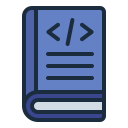
Basic Programming Concepts Explained
Welcome to the fascinating world of programming, where we translate human ideas into executable commands for computers. This page aims to unravel the fundamentals of programming, making it accessible for beginners and providing a comprehensive overview of key concepts. Whether you’re just starting out or brushing up on your knowledge, this guide will deepen your understanding of programming basics, equipping you with the foundational knowledge needed for further exploration in the tech world.

Previous slide
Next slide
Key Programming Concepts
Variables and Data Types
In programming, variables are used to store information that can be referenced and manipulated. Data types specify the kind of data a variable can hold, such as integers, strings, or booleans. Understanding how to use variables and data types effectively is foundational to writing efficient and functional code.
Control Structures
Control structures guide the flow of a program by determining which blocks of code are executed based on certain conditions. Common control structures include if-else conditions, loops, and switch cases. Mastery of these structures allows programmers to make complex decisions and perform repetitive tasks effectively.
Functions and Procedures
Functions and procedures are blocks of code designed to perform specific tasks. A function typically returns a value, while a procedure may not. These constructs help organize code into modular and reusable components, making programs easier to manage and understand.
Debugging and Error Handling
Identifying Bugs
Debugging is a critical skill for any programmer, involving the process of identifying and fixing errors in code. Bugs can arise from a variety of sources, including syntax errors, logic flaws, or unforeseen edge cases. A systematic approach to debugging is essential for developing robust applications.
Tools for Debugging
There are numerous tools available to help programmers diagnose and fix errors. Integrated development environments (IDEs) often include built-in debuggers, allowing for real-time tracking and correction of issues. Additionally, understanding error messages and logs can be invaluable for pinpointing problems.
Error Handling Strategies
Proactive error handling is crucial in writing resilient code. By anticipating potential errors and implementing strategies such as exception handling and validation checks, programmers can ensure their applications handle unexpected situations gracefully, maintaining stability and user trust.
